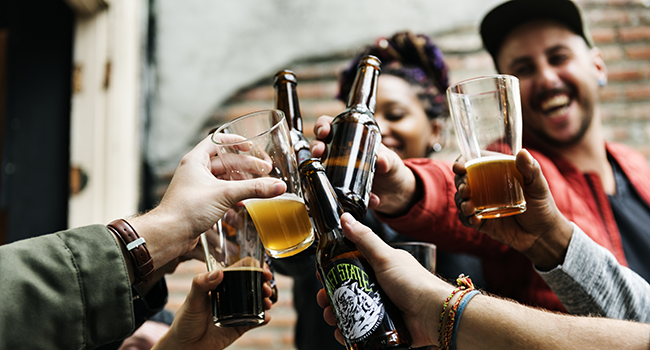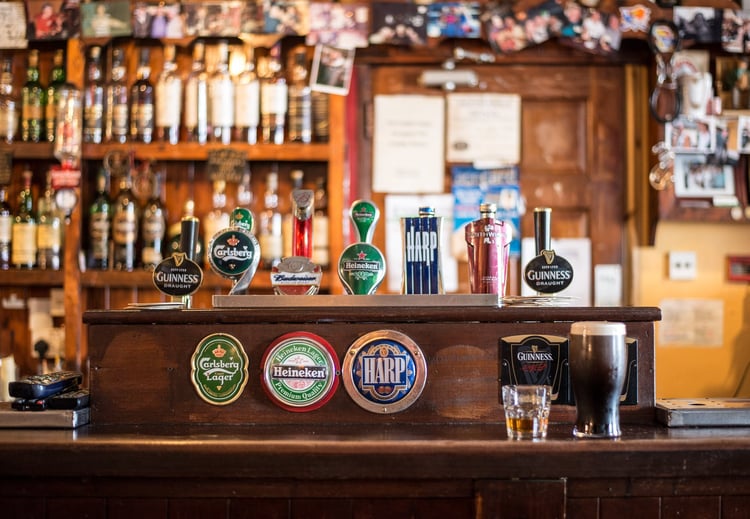In restaurants, food sales are the primary service of the business where beverage service is an add on to engage and enhance the dining experience. A pub on the other hand is more about the sale of beverages than food.
However, irrespective of the beverage service you provide, you will become known for your food and food service. After all, a pint of beer is pretty much the same from one pub to the next, but poorly served food and poor menu choices can sink your pub business quickly.
To prevent that from happening, here’s what you need to know before opening up a pub:

Industry experience and contacts can help
It certainly helps if you have past industry experience, but it’s not impossible to set up a pub without it either. If you have experience, where does your experience lay in the industry? Many people have great experience in the FOH or BOH but few have both.
As the business owner of a pub, you will be advantaged by a keen understanding of the FOH and BOH operations of your venue. You don’t need to be an experienced chef, but you should have a keen awareness and insight into menu development, food costing and customer service.
Experience behind the bar and experience supervising staff is also useful. Don’t forget about the beverage side, that’s why you’re in the business! The careful design, calculation for cost of sales and beverage menu planning is just as complex as a food menu and equally important.
If you don't have strong experience perhaps you have contacts in the industry who really know their stuff. Connect with them, it's important to find the right people. Ultimately their knowledge, experience and skills will help with the success of your pub.

Know the trends and fades
A trend is the steady movement of customers seeking out healthier menu choices - for example organic options, low fat and low cholesterol foods are an increasingly strong trend driven by consumer demand.
Organic wines, craft beers and spirits, are also growing in consumer demand. It may only be a matter of time for this trend to spill over into the beer market if it has not done so already.
You may be a pub, but make no mistake, a well-planned food and beverage menu with interesting offerings for your target market will build your success.
A fade, on the other hand is shavings of imported truffles in your beef burger. It might be nice this menu cycle, but are you going to do it again? Probably not. There is absolutely nothing wrong with a gourmet burger, but make sure it’s in line with what consumers want, and not just a fade.
Identify your service style
Pubs are generally more casual by nature, the question here is if you will only offer full table service, or will your customers order and pay directly at the bar for the food and drinks they order? Or a combination of service styles?
Your decision on this will dictate your available space and how you plan to use it. The number and type of staff and training required will also have an impact on your bar and kitchen equipment needed.
Have a strong menu
Your menu may well be the most important piece of real estate your business owns. It will impact all of the following:
- Your location
- Market plan
- The design and layout of your bar and kitchen areas
- Customer base and the employees you hire
- The starting point to develop your cash flow
- Your décor and overall look
If your menu offers a range of deep fried items for example, this will dictate equipment needed in the kitchen, a deep-fat fryer, extensive exhausting systems and fire suppression systems as well as inspection and approval of local fire and health authorities.
This will also affect who you recruit for your kitchen staff and the type of culinary training they have. Are you offering a vast array of draft beer? Then you will need the right suppliers who understand beer products, its proper storage, distribution, delivery and maintaining its quality.

Know your funding sources
It’s good to have this sorted out before you begin. You could do some things on a shoe-string budget or even boot-strapping, but a pub will need a fairly significant amount of capital to create your dream, long before the first paying customers come through your door on opening day! Plan for that well in advance.
Will you be using your own savings to finance your start-up? A bank loan? Through investors? Equity or debt financing? Or will a substantial line of credit work for you? Know before you go. Insufficient capital is usually one of the biggest determining factors for start-up business failures, especially in the food and beverage industry.
If you're unsure where to start, it's best to get help from financial advisers or planners who will guide you in the right direction.
Identify your business concept
Having a strong concept for your business is vital and it must meet your lifestyle. Too frequently a restaurant or pub fails because the owner loses sight of the concept and becomes disillusioned with it.
The lesson here is to be authentic in your concept and offering, while fitting into your locale and audience. A nautically themed pub for example, will be a helpful draw at the beach or seaside resort, but it may fall flat if its 200km away from the nearest beach or marina!
Determine your business structure
Liability is a constant threat to any business, especially the food and beverage industry where there are so many potential pain points. Being an incorporated business offers some advantages of protection, for example:
Potential risks:
Limited liability (be careful with this one!), as a pub, your primary business activity is selling alcoholic beverages to the public. There is always the risk of potentially and sometimes unknowingly over-serving a customer to a state of intoxication and liability insurance in an incorporated business may not be enough to protect you and your staff if you are found guilty of over-serving your customers.
Easier to get financing:
As an incorporated business you will be viewed as more “stable” in the market place and this may help with some of the criteria around financing options.
Responsible beverage service:
Almost every jurisdiction has a legal process in place for handling difficult customers and insure they are not over-served with alcoholic beverages. Doing so can put many lives needlessly at risk.
Two things: know the laws in your region and make sure your staff members are adequately trained in this key area of your business. In fact, employees that have not received the required training around beverage service and security are normally not permitted to serve alcoholic beverages to anyone.
Find the right employees
Along with the cost of beverage and food, the cost of labor is one of the top expenses in the food and beverage industry. Here are a few hints to keep it in check.
Job descriptions and skills:
Determine your staffing needs, have detailed job descriptions and task lists completed, its easier to recruit and hire when you know what needs to be done and by whom.
Recruitment:
Besides the traditional approaches and social media, be creative, look to local colleges with hospitality programs and explore their career development options for their graduates.
Orientation and training:
A strong robust orientation and training program needs to be in place, especially if you are a new pub in town and you need to establish a great reputation fast for quality service and products.
In the very early stages, make training and on-going employee training a way of doing business. Train employees up and cross train as well to help off-set some of the industry challenges with employee turnover.
Performance:
A well thought out performance evaluation process can help encourage open communication and feedback in both directions. When your employees “get” your mission and values as a business, it goes a long way towards creating happy employees and ultimately happy customers ready to open their wallets and buy from you!
Owning a pub is a fantastic business and life style choice, yes it can be a lot of work and even stressful at times but as a more casual business environment it offers great opportunities to work with many diverse people from your community, supply a gathering place for friends and provide a place where people can relax and enjoy themselves…. You should too.
Start your online hospitality training with Typsy. Start your 10-Day Free trial and explore our course library.
 |
Mike Walmsley, is the author of '69 Tips For Better Food & Beverage Profit'. Stay tuned for the next book in the series, '101 More Tips For Better Food & Beverage Profit', coming out soon on Amazon! |
You might also like: